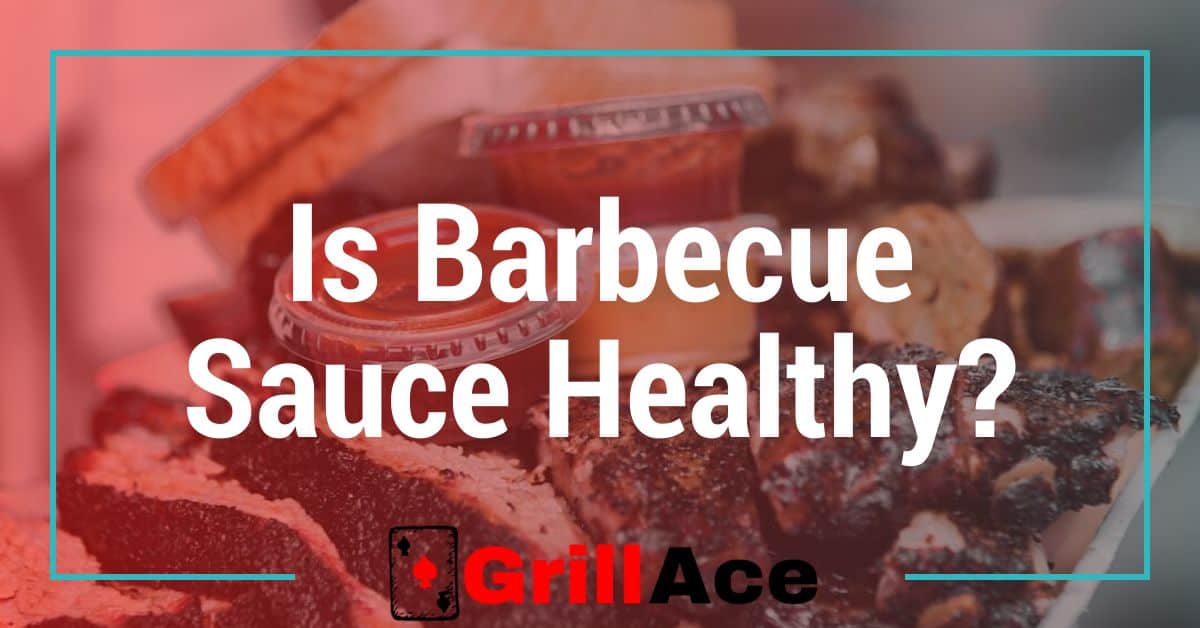Barbecue sauce is a popular condiment used in various dishes, especially in grilling and smoking recipes. It adds a delicious tangy and smoky flavor to meats, vegetables, and other dishes, prompting many people to ask whether it can be considered healthy or not.

Though BBQ sauce may contain small amounts of certain vitamins and minerals like potassium, vitamin C, and vitamin A, the overall health benefits of these micronutrients may be limited. Often containing added sugars, sodium, and preservatives, store-bought barbecue sauce is generally not considered a health food. Nonetheless, some brands offer healthier, reduced-sugar and lower-sodium options.
To maintain a balanced diet and avoid overconsumption of unhealthy ingredients, it is recommended to look for healthier BBQ sauce alternatives or make homemade sauce with natural ingredients. This way, you can still enjoy the flavorful experience of barbecue sauce while making a more health-conscious choice.
Is Barbecue Sauce Healthy
Calories and Nutrients
Barbecue sauce, also known as BBQ sauce, is a popular condiment used to flavor various grilled and smoked dishes. However, its healthiness depends on the specific brand and ingredients used. In terms of calories, a typical two-tablespoon serving of barbecue sauce contains around 100 calories. The macronutrients in a standard BBQ sauce are as follows:
- Carbohydrates: 22 grams, including sugars
- Fat: 0 grams
- Protein: 0 grams
It is worth mentioning that BBQ sauce is generally low in vitamins and minerals such as calcium.
Added Sugars and Sweeteners
One of the main concerns regarding BBQ sauce is its sugar content. Many commercial brands rely on added sugars, such as high-fructose corn syrup, to achieve the desired sweetness. A standard serving may contain over 10 grams of sugar, which can contribute to health complications if consumed in excess, like heart disease and diabetes.
If you’re looking to minimize sugar intake, consider choosing barbecue sauces with less than 5 grams of sugar per serving or those that use natural sugars from fruits and vegetables instead of added sweeteners.
Preservatives and Additives
Another aspect to consider when it comes to the healthiness of barbecue sauce is the presence of preservatives and additives. Store-bought BBQ sauces often contain sodium, with some brands having up to 190 mg of sodium per serving. High sodium intake can contribute to increased blood pressure and other health risks.
To make a healthier barbecue sauce, you can opt for homemade versions using whole, minimally processed ingredients. This ensures that you are in control of the ingredients, including the sugar and sodium levels, and it allows you to avoid artificial additives and high-fructose corn syrup.
In conclusion, the healthiness of barbecue sauce depends on the specific brand, ingredients, and serving sizes. Monitor nutrition labels for calorie, sugar, and sodium content and choose options with lower amounts of added sugars and sodium for a healthier condiment choice.
Key Ingredients in Barbecue Sauce
Tomato Base
The primary component of most barbecue sauces is a tomato base, consisting of ingredients like tomato sauce, tomato paste, crushed tomatoes, or ketchup. Tomato-based sauces are rich in lycopene, an antioxidant, and also contribute to the tangy flavor found in barbecue sauces. Ketchup-based sauces may have a higher sugar content than those made from tomato sauce or paste.
Vinegars
Vinegars are another key ingredient in barbecue sauces and provide acidity to balance the sweetness. Commonly used vinegars include:
- Cider vinegar: It adds a mild, fruity aroma and taste to the sauce.
- Apple cider vinegar: A more robust fruity flavor compared to regular cider vinegar.
- Distilled white vinegar: A generic vinegar with a neutral flavor that primarily adds acidity.
Vinegar-based sauces may be lighter and have a more tangy flavor than their tomato-based counterparts, making them suitable for different types of meat, such as pork or chicken wings.
Sweeteners
Sweeteners add flavor and help create the caramelization that occurs when the sauce is applied to meat during cooking. Common sweeteners include:
- Sugar: The most basic type of sweetener found in many store-bought BBQ sauces. High in carbohydrates, sugar can contribute to the overall calorie count.
- Brown sugar: Adds a rich molasses flavor and pairs well with spices like paprika and cayenne pepper.
- Molasses: Less sweet than sugar; it contributes to the dark, rich color of BBQ sauce.
- Honey or maple syrup: Natural sweeteners that can be used in homemade and organic barbecue sauces as a healthier alternative to sugar.
Spices
Various spices add depth and complexity to the flavor of barbecue sauce. Some commonly used spices are:
- Garlic: Fresh or in powder form, garlic is a base flavor in many BBQ sauces.
- Onion: Chopped onion or onion powder adds savory flavor to the sauce.
- Paprika and smoked paprika: Adds color and contributes a smoky, earthy taste.
- Chili powder and cayenne pepper: Creates heat and spice in the sauce.
- Black pepper: Imparts a sharp, pungent kick to the sauce.
Mustard
In some barbecue sauce recipes, mustard is used as a base or as a flavor enhancer. Mustard-based sauces are often tangy and can be found in various regional styles. Common types include:
- Yellow mustard: A classic ingredient used in Carolina-style BBQ sauce.
- Dijon mustard: Has a sharper, more pungent flavor than yellow mustard.
- Whole-grain mustard: Adds texture and a mild spice to the sauce.
In addition to their distinct flavor profiles, mustard-based sauces may also provide a source of vitamin A and some trace minerals.
Healthy Alternatives to Store-Bought Barbecue Sauce
Homemade Barbecue Sauce
Making your own barbecue sauce is a healthy and customizable option. It allows you to control the ingredients and adjust the flavors to your preference. A simple homemade recipe could include:
- Tomato paste
- Applesauce
- Spices
- A modest amount of unrefined sugar
To make the sauce, start by heating a small amount of olive or coconut oil in a saucepan. Add minced garlic and chopped yellow onion, and cook until softened. Stir in the tomato paste, applesauce, spices, and sugar, and let the mixture simmer for about 20 minutes. This homemade sauce is vegan, gluten-free, and paleo-friendly. Once cooled, store it in an airtight container in the refrigerator for up to two weeks.

Low Sugar Options
« Can You Freeze Barbecue Sauce? The Ultimate Guide
BBQ List for Party: Essential Items for a Successful Cookout »
When looking for store-bought healthy barbecue sauces, keep an eye on the sugar content. Aim for sauces with low sugar and low sodium levels. Be cautious of sauces that use alternative sweeteners like high-fructose corn syrup or artificial sweeteners (aspartame, saccharin, sucralose), as they may be linked to bad gut health. Some recommended low sugar options are:
- Stubb’s Original Legendary Bar-B-Q Sauce
- Yo Mama’s Classic BBQ Sauce (No Sugar Added)
Organic and Natural Options
To ensure a healthier option, look for barbecue sauces with recognizable ingredients, preferably organic or all-natural. Here are a few choices:
- Bone Doctors’ Carolina Bold Barbeque Sauce
- Bone Suckin’ Sauce Thicker Style
Remember to carefully read the ingredient lists on the labels to ensure that the sauce is free from unwanted additives and aligns with your dietary requirements (vegan, gluten-free, etc.).
Pairing Barbecue Sauce with Healthy Foods
Lean Meats and Protein Options
When aiming for a healthier barbecue, opt for lean meat and protein choices. Some great options include:
- Chicken: Grilled chicken breast is a low-fat, high-protein choice. Use a healthy BBQ sauce with less than 5 grams of sugar and minimal added sodium to flavor the chicken.
- Pork: Tenderloin is a lean cut that can be marinated with a low-sugar, low-sodium barbecue sauce before grilling. Remember to avoid those with over 320 milligrams of sodium per 2-tablespoon serving.
- Ribs: Opt for leaner cuts like pork loin back ribs or beef short ribs instead of fatty cuts like spare ribs. Use a nutritious BBQ sauce to flavor the ribs without adding too much salt or sugar.
Grilled Vegetables
Barbecue sauce can also be used to enhance the flavor of various grilled vegetables. Some tasty examples are:
| Vegetable | Preparation Tips |
|---|---|
| Bell peppers | Slice into large pieces, brush with BBQ sauce |
| Zucchini | Cut lengthwise, brush with BBQ sauce |
| Eggplant | Slice into rounds, marinate in BBQ sauce |
| Portobello caps | Remove stem, marinate in BBQ sauce |
| Cherry tomatoes | Skewer on toothpicks, marinate in BBQ sauce |
Tofu and Plant-Based Alternatives
For individuals looking to incorporate more plant-based alternatives, consider the following:
- Tofu: Slice extra-firm tofu into 1-inch thick steaks and marinate in a healthy barbecue sauce. After marinating, grill the tofu for a few minutes on each side until it develops a crispy exterior.
- Vegan “chicken wings”: Substitute chicken wings with cauliflower florets, seasoned with a low-sugar, low-sodium BBQ sauce, and baked or grilled until crisp.
- Plant-based burgers: Choose a vegan burger patty and brush with a nutritious barbeque sauce before grilling to keep the patty moist and enhance the flavor.
Remember to select BBQ sauces with minimal added sugars and sodium content to ensure you’re making healthier choices when incorporating them into your meals.
Tips for Choosing Healthier Barbecue Sauces
When selecting a healthier barbecue sauce, it’s essential to pay attention to the ingredients listed on the product label. One critical aspect to consider is the sugar content. Look for sauces low in sugar or those using natural sugar alternatives, as some traditional barbecue sauces can contain high amounts of added sugars, often in the form of high-fructose corn syrup.
Healthy barbecue sauce options may include organic ingredients and be free from artificial additives. Keep an eye out for those with simple, recognizable ingredients, as these are often more nutritious choices. It’s also helpful to consult a registered dietitian if you need personalized advice on selecting a suitable sauce for your dietary needs.
Here are some key factors to consider when choosing a healthier barbecue sauce:

- Organic: Opt for sauces with USDA Organic certified ingredients or those that follow clean-label practices, as these sauces will have fewer additives and be free from potentially harmful chemicals.
- Low sugar: Look for sauces with less than 8 grams of sugar per serving or those using natural sugar alternatives like honey, maple syrup, or fruit juices.
- Seasonings: Healthier sauce options may contain a variety of seasonings and spices instead of relying solely on sugar for flavor. This approach can enhance taste without adding excessive amounts of sugar.
- Vegan, gluten-free, and dairy-free: If you have specific dietary needs or preferences, seek out sauces that meet those needs – for example, vegan, gluten-free, or dairy-free options.
Additionally, don’t forget about the versatility of barbecue sauce. Aside from grilling, you can also use it as a marinade, salad dressing, or dipping sauce. Choosing a healthier sauce can have multiple benefits, as you can incorporate it into various dishes to add flavor without compromising on nutrition.
Lastly, when possible, opt for sauces with sea salt instead of table salt. Sea salt contains trace minerals that can benefit your health and is often considered a more natural option compared to refined table salt.













